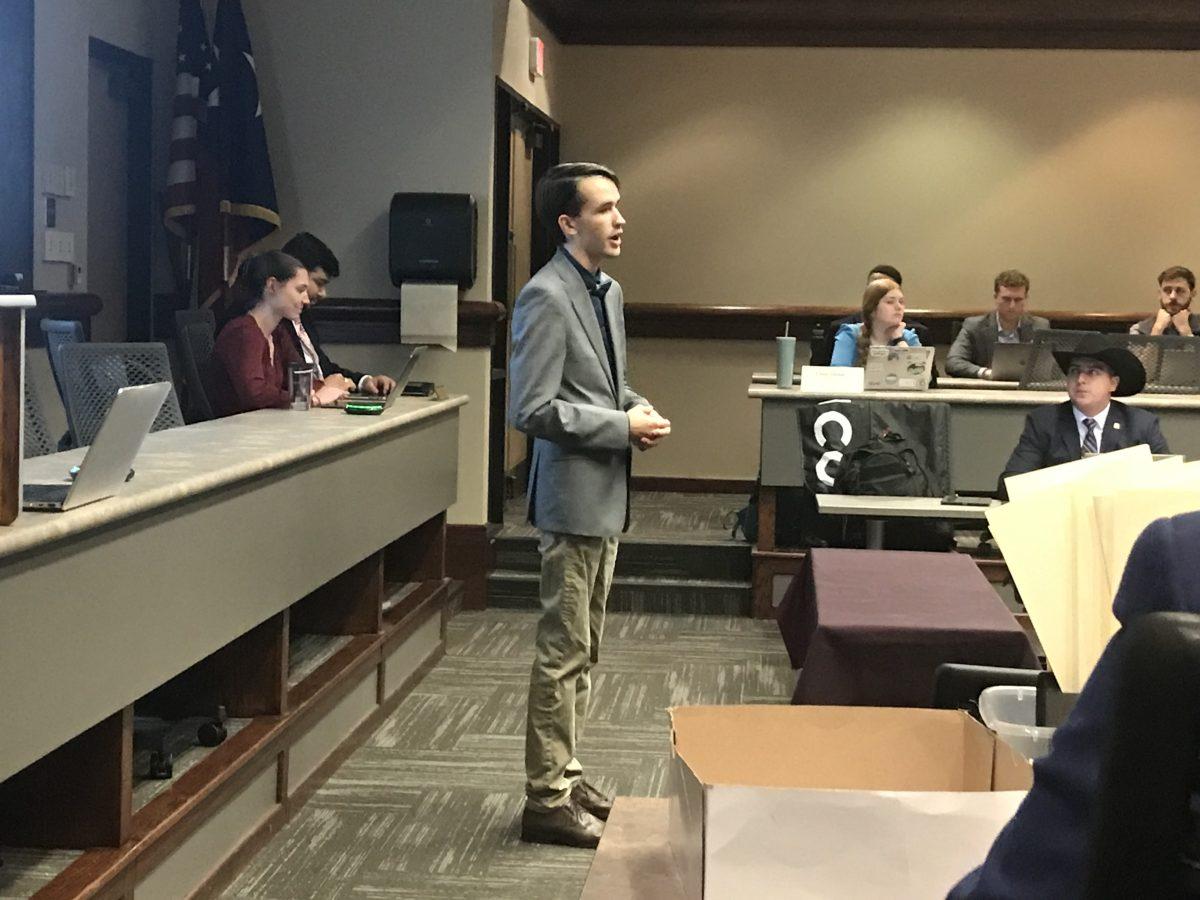In the final meeting of the 75th session of the Student Senate, senators worked quickly to push through 14 pieces of legislation before the year ended while also confirming Sawyer Bagley to the position of Chief Justice in the Judicial Court.
Beginning at 7:09 p.m. on April 12, the senate began with a roll call, an invocation and the pledge of allegiance, followed by a recitation of the Aggie Honor Code and Mission Statement.
A moment of silence was then held for the Silver Taps Memorial, where the senators honored Aggies Nathaniel Callaway, Austin Hodge and Christian Owen.
After moving past Open Forum and approving the minutes of the last session, Associate Justice Sawyer Bagley spoke to the senators on why he should be confirmed to the position of chief justice after his nomination, arguing a more passive position of judicial restraint, impartiality and textualism.
“I believe that justices are not to go beyond the responsibilities or powers given to them within the code,” Bagley said. “Adhering strictly to the text instead of my own interpretation or another person’s interpretation.”
After informing the senate of his qualifications — judicial court experience, church volunteering and UIL — Bagley spoke on his future outlook if he were to be confirmed, where he advocated for better training for the Judge Advocate General, or JAG, Commission and a restructuring of the court’s bylaws.
“I’ll maintain its position as the figurehead of the third branch,” Bagley said. “The [judicial court] itself will be a neutral and passive branch, and it will continue with its interactions as stayed by the code and within the bylaws.”
A vote occurred, with the senators voting to confirm Bagley as chief justice by a vote of 25-2. Chief Justice Bagley was then sworn into the position in front of the senators.
The senate then continued considering the consent agenda, where S.R. 75-26, the Commending Sam Bennett Resolution, was passed without objection and S.R. 75-27, the Fightin’ Texas Aggie Band Resolution, received an objection by Rules and Regulations Chair Carly Oldag, who moved to deviate from the agenda, moving the resolution to New Business.
The deviation passed a vote, and the senate entered a period of Unfinished Business, beginning with S.A. 75-28, the Let the Blazers Breathe Act, a resolution proposing a change to the senate’s dress code, allowing anyone who wants to wear a dress to do so without the requirement of pairing it with a blazer.
The resolution passed a vote of 23-1.
S.A. 75-29, the My Elitist Good Friends Act, proposed by senators Joshua Benson and Ben Crockett, was considered next, changing the word “freshman” to “non-ranking” and proposing a change to avoid hearsay by citing the creation of the phrase “Elitist Good Friend,” now referencing both individuals who could potentially be credited as authors.
After a period of no questions, Pro Tempore Brandon Rea debated against the legislation.
“I’ve seen issues with this piece just because I don’t think this is something that needs to be codified down into the code,” Rea said. “I think if this is something that is important to you … then that is something that is perfectly appropriate to ask when we are electing a Pro Temp[ore].”
After more debate among the senators, the resolution headed to a vote, passing 21-2.
Senators Benson and Dalton Flatt then presented S.A. 75-30, The Committee Application Standardization Act, legislation meant to create requirements and core criteria for those applying to committees in the Student Government Association, later passing with a vote of 22-0.
S.A. 75-31, the Spring Budget and Reallocation Act, was then brought to the forefront, aiming to use the entirety of the $50,000 budget. The legislation would have committees present budgets to the Finance Committee, increasing transparency on the status of how much each committee has left of their original allocation and how much they plan on using.
The legislation passed with a vote of 22-1.
The S.A. 75-32 OldAg Omnibus Act, proposed by Oldag, would increase the number of senators required to sponsor a bill from one to three.
“If you can’t get at least three senators to sponsor a piece of legislation…then maybe it’s not something that should be worth hearing,” Oldag said.
It also proposes altering the rules to have only student senators of the current session be capable of authoring acts or bills, Oldag said.
“I don’t see a reason why any general student would need to come forward … with something that modifies our code, that has to do with the internal procedures of student government and what we do,” Oldag said. “I think it would be better if our roles were more clearly defined as the legislative body.”
Another change in the act proposed striking out parts of the code with conflicting student requirements. As long as students comply with S.B.41, a set of rules laying the requirements for those wanting to be involved with student organizations, then no other requirement is needed.
These changes, along with others, were debated by the senators for the next few minutes, with voting beginning soon after. The act passed 18-2.
Changes to S.A. 75-33, The Benson Act, were then presented by Senator Benson, with simplifying election regulations and streamlining other portions of the code passing with a 20-1 vote.
Speaker of the Senate Tyler Smith then paused to clarify the current proceedings.
“The reason that there are so many acts that are completely internal to the student senate at this meeting is because this is the last legislative meeting of the 75th session of the Student Senate,” Smith said. “This is completely normal. The reason you’re seeing so many internal things is not because the Student Senate does not care about students, it is because at the end of the day, we are also a student organization that has to govern itself.”
Speaker Smith then continued the proceedings to present changes to his own legislation, S.A. 75-34, The Constitutional Organization of Associated Legal Standards Act, quickly heading to a vote and passing 24-1.
Senator Applewhite then moved to deviate from the agenda, proposing a move to the top of New Business and then Open Session, returning to finish Unfinished Business later in the session.
Requiring a two-thirds vote, the deviation narrowly passed with a vote of 14-7.
The Fightin’ Texas Aggie Band Resolution, S.R. 75-27, was then considered, being deviated to Open Session by Oldag “to avoid amendments and avoid this presentation,” quickly passing a vote, with another deviation to move to Open Session passing after and a vote to consider S.R. 75-27 in Open Session passing with a 19-5 vote.
Senators Gus Rodriguez, Benson and Corbitt Armstrong then went to the floor to explain the legislation.
“This resolution advocates for the nationally famous Fighting Texas Aggie Band’s halftime performance to be broadcasted in college football television,” Benson said.
No debate occurred, with the piece heading to vote and passing.
Academic Affairs Chair Angelina Baltazar then spoke to the floor about posthumous degrees, stating that in cooperation with the Faculty Senate, they will be proposing a resolution expanding the eligibility for a posthumous degree upon death, altering the current rule that only students in their final semester are eligible for posthumous degrees upon death. The legislation was quickly passed following no opposing debate.
Legislative Relations Chair Patrick Englehart then moved to deviate to consider S.R. 75-28, the Texas A&M-Qatar Relationship Resolution, passing 15-6.
Senator Ben Fisher then claimed the legislation was out of order, as it had no sponsors listed.
“It doesn’t follow the template, and it’s not in the right format,” Oldag said. “Therefore, since it’s been brought to our attention, I am going to call it out of order.”
The senate then took roll call and ended the meeting.
Chair Englehart reached out to The Battalion soon after the session, providing the following statement:
“This was our final meeting of the 75th session, and instead of considering pieces that directly affect the students or the standing of [A&M], senators Benson, Applewhite and Armstrong disgracefully decided to obstruct the business of the senate by endlessly bringing up tedious, unserious and pointless internal senate workings,” Englehart wrote in a text. “I authored three pieces on the agenda concerning the importance of upholding academic freedom and the threats it faces, the harms of marijuana criminalization and how to support students and most importantly, recognizing [A&M]’s direct complicity in corruption and modern-day slavery in Qatar. The obstructionism of Senators Benson, Applewhite and Armstrong make a mockery of the will of students and was used to cover for A&M’s refusal to acknowledge and rectify the horrors of slavery it perpetrated in the 21st century.”










